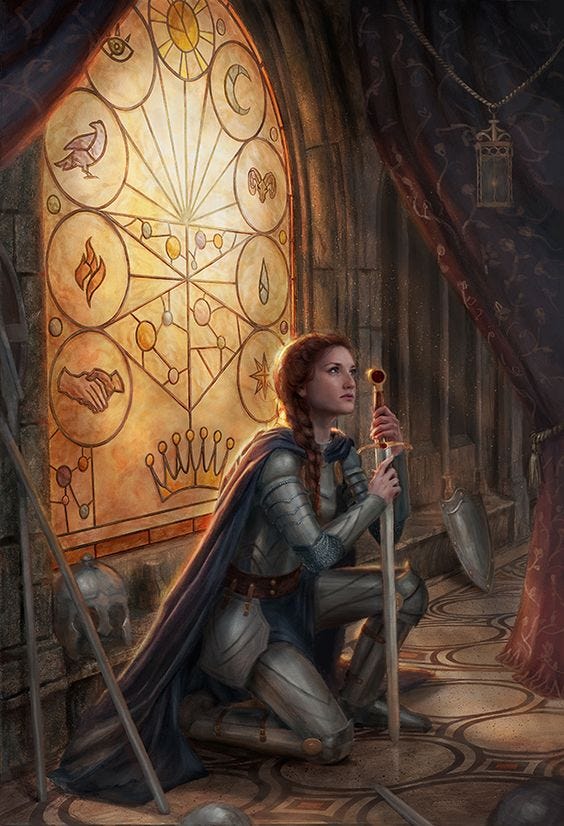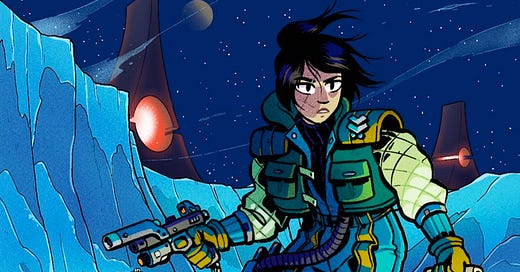Jan '22 Murmurs: Plutonian Shards + Tales from the Low Cantrefs
Plus, designing games centered on idealistic characters
Happy New Year! This installment will include a look back at my gaming from the end of 2021, and a look forward at a future project I feel excited about. Also, there may a hiatus between this month’s newsletter and the next one I send out. We have a baby due in February, so her happy arrival may disrupt gaming and writing about games for a little bit of time.
Ran: Plutonian Shards
I ran a series of my swashbuckling sci-fi game Plutonian Shards (former working title: Plutonian Shore) online in December. We played in the default implied setting of the game: the shattered remnants of the dwarf planet Pluto, where a handful of factions lord it over the precarious underclass of the Solar System—including the crew of scoundrels made up of the player characters.
Highlights: This series was a whole lot of fun! I had an excellent crew of players with memorable characters: a Prodigal Captain+Negotiator on the run from her wealthy corporate family, a Fallen Stowaway+Pilot who was the last of the Armageddonist Order (or so she thought!), a Neophyte Medic+Cook fresh off of working at a space truckstop, and a Prototype Mechanic+Last Hope of the Solar System who was a synthetic being designed to interface with the Void.
The crew’s adventures included rescuing a mining colony from a malfunctioning military robot, then weathering an ambush by pirates and striking a deal with the Pirate Queen. In the finale, they infiltrated a grand gala to steal a coveted jewel, the Star of Elysium. The Prodigal snagged the jewel but, in the process, accidentally got engaged to the prince who had it! Ultimately, the crew busted out of there as the Starbreaker Cult invaded, with the Fallen highjacking an anti-grav catering trolley to blast out through the ballroom’s roof.
There’s a Youtube playlist here with the whole series, if you want a sense of what actual play is like.
Musings: I learned some helpful things about the game while running it, and I got useful feedback from my players. I’ll definitely be tweaking the advancement system so that it’s easier for players to collect XP.
One other change I’m mulling is broadening the utility of a few ship-based crew roles. Currently, if you choose to be the Pilot, the Gunner, or the Cook, you take Advantage on specific Ship Moves (respectively: take evasive maneuvers, open fire, and go out into the cold). But these came up only a handful of times in the series—a lot of each adventure takes place off of the ship itself! I want players to feel like they get to be awesome by using these roles, not feel like they drew the short straw during character creation. So I am considering having these crew roles grant advantage more broadly. Pilot, for instance, would give you its bonus whenever you’re piloting a vehicle, whether or not it’s your crew’s ship. So our Fallen Pilot could have used it to exit the gala on her improvised escape vehicle! Is there a broader design lesson here? Maybe it’s this: don’t constrain special abilities past the point of them being special!
Final Thoughts: I’m very excited by how this game has developed, and as I keep iterating and improving on it I am also going to be pitching it to publishers. If you want to keep up with Plutonian Shards development, sign up here!
Played: Tales from the Low Cantrefs
Our in-person campaign of Tales from the Low Cantrefs continued! This time, I got to be a player while my wife Leah ran our second village. I played Draenen the Cloak, a skilled young hunter with rusty social skills.



Highlights: Once again, this coming-of-age hearth fantasy game delivered on its premise. We created a memorable village together, where important decisions are made by the council of apiarists in consultation with the village’s revered bees. Our young PCs confronted troubles like a parasitic dalen arm, a fragment of a sorcerer’s unquiet spirit, and the adults attempting to hastily throw a wedding together to appease the blighted bees. (The bride and groom were to wear flower crowns, stand in a hurriedly constructed hexagon, and hold honeycombs in lieu of bouquets.)
That last trouble was especially personal for Draenen, as the wedding being arranged was between his crush (the young huntress Rhosyn) and his older brother. Draenen had to try to open up about his feelings to dissuade them from going through with the ceremony (mostly because we had learned it would definitely not work to heal the bees, he told himself). This went somewhat disastrously, as opening up about his feelings was one of the things Draenen was worst at.
In the finale, I fared somewhat better at my task: distracting an angry, ensorcelled moose with my ranger skills. This opened up space for our Flint to have a fiery duel with our Loom, who was possessed by a piece of an ancient sorcerer’s soul. By the end of things, surprisingly many people and bees survived! Draenen and Rhosyn even got a happy romantic epilogue.
Musings: A couple times in this campaign, we’ve reached for a move that isn’t there: some non-violent way of negotiating conflict among PCs, like a “persuade” move. Each time we’ve negotiating something that works for our table, whether it’s primarily roleplaying a conversation or working out the stakes for a “stand strong” roll (and who should get to roll it!). But it does feel like an absent piece of the game. I wonder if we’re running into more strategic disagreements or ideological conflict amongst our PCs than other folks playtesting this game? I could see two directions the game could go that might address this: either adding a move to cover this type of interaction, or building in more PC bonds/backstory elements that would make the PCs more likely to be on the same page.
Final Thoughts: This campaign is going strong into the new year! Another player has stepped up to GM, so Leah and I both get to be players in our third village. And, as the game promises, the apocalypse ever advancing in the background. This third village’s troubles aren’t simply folklore threats close to home—they’re connected to the tribulations of an overseas empire that has sent scouts to our isolated, suspicious enclave. I can’t wait to see where it goes!
Design Discussion: Idealism
I enjoyed participating recently in a Magpie Games seminar on designing unique mechanics for Powered by the Apocalypse games. During the Q&A, an attendee asked an interesting question: given the way PbtA mechanics create messy, snowballing situations, are they best suited for stories about morally gray or notably flawed characters?
The presenter, Brendan Conway, correctly answered no. PbtA games can tell a wide range of stories, and it’s often interesting to see idealistic characters aspiring to heroism in the face of chaotic, no-easy-answers situations. This is absolutely central to Brendan’s game Masks, where each PC has to care about what it means to be a hero (it’s hard-coded into the mechanics, with your stats shifting based on what people tell you about who you are or how the world works—i.e. whether you’re a hero and what heroes ought to do).
This got me thinking about idealistic characters. What games and mechanics are out there that are particularly suitable for telling stories about people with high ideals, commitments to virtue, strong honor codes, etc.?
I personally love playing characters committed to doing what’s right, even in grittier settings where that attitude gets them labeled quixotic. But sometimes that means being comfortable playing against the core mechanics of the game, that assume PCs are more Machiavellian, or at best lovable scoundrels. (Playing a sincerely idealistic knight in Rebel Crown was arguably an example of this.)
Girl Underground is interesting to me in this context. The Girl begins with a set of Manners that, per the game text, are “unfair and very wrong.” Things like “Young ladies must always follow instructions,” or “Young ladies must always keep a smile on their face.” The Girl will refuse to mind her manners during gameplay, and get to write new Beliefs that replace Manners and represent the ideals she is coming to claim as her own.
What would it look like if a game started you off with something like Manners, but that you might not rebel against? Where you will grow and change, but rejecting your initial beliefs about good conduct isn’t a foregone conclusion? I am tinkering with a mechanic like this, called Lessons, in my in-development game Vow of the Knight-Aspirants.



At this early stage (things may shift as I playtest the game), some Lessons come with your playbook, and grant you bonuses, handicaps, and XP triggers as you live up to or defy them. You will be taught more Lessons in play—by enemies trying to poison your ideals, by well-meaning people trying to mold you to be more like them, by peers trying to work out with you what knighthood really means. There will be ways to reject and rewrite Lessons, either to wholly re-work them or introduce nuance. But I tried to pick starting Lessons that are arguably true, so that some PCs might hold fast to them throughout a campaign. For example, the Jackdaw’s starting lesson is “When times are darkest, a smile and a laugh are mighty weapons indeed.” This could be lived out in a sort-of-flippant way or in the more mature mode of a knight holding onto the light after living through great tribulation. And if interpreting these lessons provokes philosophical discussion at the game table, I’m all for it!
Sign up above if you want to stay in the loop about Vow of the Knight-Aspirants. Are there other games and mechanics I should be checking out that deal with themes of idealism? Let me know what’s out there that would be an interesting part of this conversation!
Elsewhere
—On Twitter I did a roundup of my 2021 gaming. I played 100 sessions total, which is the most I’ve played in any year of my life so far.


—I guested on the podcast Sidekicks and Sidequests, where I chatted about my RPG design work and created an NPC for the podcast’s campaign: Jasper, the quixotic, swashbuckling frog (like a literal, tiny frog).
—For the Top Shelf show on the TPKRoleplay Twitch Channel, I got the chance to play my game The Great Soul Train Robbery. That’s the excellent conceit of Top Shelf: the host Mads learns to run RPGs and invites the designers on to be players. This was exciting for me! I’ve run a whole lot of Great Soul Train Robbery, but played it only once or twice. On Top Shelf, I played Lamentations Carter, a Revivalist motivated by Prophecy and Greed. Check it out here.
—My one-on-one RPG The Tabula Initiative got some love! Pod of Blunders ran a nice review of it, and then demo-ed it as an actual play podcast. Always exciting to see folks play this game of an amnesiac assassin on the run from their past.
—I contributed to the Gauntlet Game of the Year podcast. Listen to it to hear about the games that excited Gauntlet community members in 2021. As a little teaser: my game of the year is a game I talked about in this Substack… Okay, it’s 100% Tales from the Low Cantrefs, who am I kidding?!
Till next time, may you win the trust of your crew, protect your village’s natural resources, and live out your highest ideals.
Gamefully yours,
Alexi






Hmmm. The Basic Moves list does currently leave Courage a little shortchanged (one move, compared to two for all the others).
When you tell a friend that you think they're wrong, roll +COURAGE...
There could be something there!